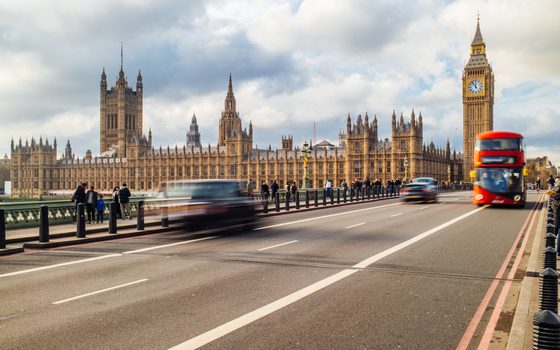New research: UK financial system is ‘least resilient in the G7’
Threats posed by Brexit make it even more exposed to future shocks
13 November 2017
- Among G7 economies, Britain’s financial system is by far the least resilient to future shocks
- New Economics Foundation’s ‘Financial System Resilience Index’ measures stability across six factors including diversity, interconnectedness and complexity
- Analysis finds that any Brexit outcome other than a ‘soft Brexit’ will likely involve significant disruption to the financial sector, posing risks to stability
Britain’s financial system is by far the least resilient of all the G7 major economies – and the threats posed by Brexit make it even more exposed to future shocks, according to a new report from the New Economics Foundation.
The report – Still Exposed: The UK’s Financial System in the Era of Brexit [2] – measures G7 countries [3] against a Financial System Resilience index, developed through expert roundtables, interviews and academic literature review. The index looks beyond simply how much capital banks are holding and measures countries against key factors influencing resilience, including diversity, interconnectedness, asset composition and complexity [4].
The UK scores 34.9 out of a possible 100 for financial system resilience, almost half the score of Italy – the next most resilient financial system in the G7. Germany has the most resilient financial system in the G7, with a score of 78.5.
Since 2015 when the New Economics Foundation last ran the index, the UK’s resilience has improved in some areas. But it still has the largest, most concentrated, complex and interconnected financial system in the G7, and is therefore highly vulnerable to future shocks. And with recent data suggesting levels of household debt will rise above 150% of GDP by 2019, the UK’s relative lack of resilience to future shocks ought to be a major concern.
The report also forecasts the likely effect of different Brexit scenarios (hard Brexit, soft Brexit or a bespoke agreement) on the UK’s financial system. It finds that any outcome other than a ‘soft Brexit’ would pose significant risks to financial stability.
The New Economics Foundation makes four recommendations to improve the resilience of the UK’s financial system:
- Avoid a race to the bottom on financial regulation: Slashing regulation will create a less resilient financial system and jeopardise the long-term social and economic health of the UK
- The Bank of England should strengthen prudential and macroprudential regulation to mitigate risks posed by Brexit: This should involve increasing required capital levels for big, risky banks and examining other factors when assessing financial system resilience, including asset and liability composition
- The Treasury should urgently review options for addressing the lack of diversity in the UK banking system: For instance, RBS could be transformed into a network of local or regional retail banks with a mandate to serve their local area
- The Competition and Markets Authority should focus on diversity of provision in the banking sector, not just market share: Genuine competition requires a diversity of providers, not just more banks following the same business model
Andrew Pendleton, Director of Policy and Advocacy at the New Economics Foundation, said:
“The great financial crisis is still wreaking havoc through our politics and democracy and still costing households dearly. It’s deeply disturbing to see through this research how our system is still woefully exposed to shocks that could be even more cataclysmic.
“With the vast uncertainties of Brexit on the horizon, consumer debt rising, and wages failing to keep pace with inflation, just such a shock seems ever more likely. And our financial system is simply not ready for that.
“We need to see stronger regulation by the Bank of England to protect our financial system from over-exposure to risk. We also desperately need a more diverse banking system that invests in people, productivity and jobs and is responsive to the real needs of the different regions of the country.
“Above all, we must avoid a Brexit-induced race to the bottom on financial regulation. That way lies a disaster which could dwarf the financial crisis ten years ago.”
Notes to editors
1. The New Economics Foundation is the UK’s only people-powered think tank. The Foundation works to build a new economy where people really take control. neweconomics.org
2. To download a copy of the full report, visit: /uploads/images/2017/11/still-exposed.pdf
3. The G7 countries are: the UK, the US, Canada, Japan, Germany, France and Italy. Our definition of financial system resilience is: “the capacity of the financial system to adapt in response to both short term shocks and long-term changes in economic, social, and ecological conditions while continuing to fulfil its functions in serving the real economy”. Drawing on academic and policy literature and a series of expert interviews and roundtables, we identified six key factors that influence financial system resilience defined in this way: diversity; interconnectedness; financial system size; asset composition; liability composition; complexity and transparency. We compiled proxy indicators for each of these factors into a composite index to compare the financial systems of leading advanced economies, and whether they have become more or less resilient over time. We also include the leverage ratio – the ratio of banks’ capital to their assets – as a final resilience factor, because this has been a major focus of regulators post-crisis. This makes seven resilience factors in total. We examine variables for each country through time on an annual basis from 2000 to the latest year when data is available. Our composite index combines the six resilience factors plus leverage by averaging the index scores across all seven variables, giving equal weight to each. For a full explanation of the index and methodology, read the full report at /uploads/images/2017/11/still-exposed.pdf
Topics Macroeconomics






